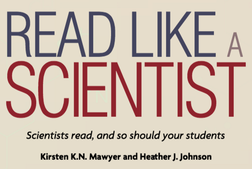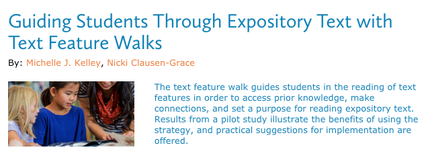Developing
Disciplinary Literacy in Science
Reading and understanding scientific writing is not always a simple task. Even for adults and professionals, scientific literature can be daunting. There can be high-level vocabulary that is very specific to the given study or proposal. Often there are numerical figures with metric prefixes, information that is compared and contrasted down to details that may seem inconsequential to the average person. When high school teachers assign scientific literature to students, some preparations may need to occur. Beyond having reluctant readers first take a deep breath, teachers may initiate a discussion regarding background knowledge on the topic, point out the text features, and discuss potential conclusions to the study.
Background Knowledge
Why do authors title their work? The title is intended to set the stage for that which is to come. Titles help us to begin to formulate thoughts about what we know, what we might expect, and sometimes titles help us to decide if we want to read more. Imagine reading a piece of writing with no title. Without the title we have little or no context to begin reading. For a high school student, especially a reluctant or struggling reader, having to read scientific literature without first some discussion to set the stage is like reading an untitled work.
Before having students read scientific literature, it is helpful to initiate a discussion on background or prior knowledge. What information does the reader need to know or assume in order to understand the writing? What has recently been studied or discussed that relates to the writing? What are some vocabulary terms students can recall and how are those terms related--antonyms, synonyms, prefixes, Latin/Greek roots. What might the reader expect from the writing?
Before having students read scientific literature, it is helpful to initiate a discussion on background or prior knowledge. What information does the reader need to know or assume in order to understand the writing? What has recently been studied or discussed that relates to the writing? What are some vocabulary terms students can recall and how are those terms related--antonyms, synonyms, prefixes, Latin/Greek roots. What might the reader expect from the writing?
Text Features
Speaking of titles, the title is a text feature. Text features are those aspects of a piece of writing that help to orient the reader. As stated above, the title helps to set the stage for that which is to come. Some authors will include bold print to help draw attention to certain important terms or subtitles. Scientific literature often contains figures in the form of photos, charts, or graphs. These usually have a caption that briefly explains what is shown. As we help students to be successful with reading scientific literature, knowledge of text features can be helpful.
Discuss Potential Conclusions
Ultimately, when reading scientific texts, it is helpful to have the ability to think like a scientist. When examining a scientific text, in the pre-reading stage, certain expectations may be made, but these must be made based on scientific thought. One common thought process of scientists is that of questioning. Scientists are inquisitive, always desiring to know more. They are skeptical, in need of proof, before they believe an assertion. Knowledge of the Scientific Method is paramount when reading the review of a scientific study. Things like sample size, variables, and controls are important to understand in order to properly interpret a scientific study. Often, we question the biases of a scientific study when evaluating the results and conclusions stated in scientific literature. Teaching students to think like scientists helps them to understand and interpret scientific literature and to evaluate the writers' conclusions based on reliability and validity of the study.
A Closer Look at Disciplinary Literacy
|
|
|
Text Dependent Analysis
Beyond reading and understanding, disciplinary literacy includes writing. When students write based on a scientific text, they must use specific references from the text to support their work. When teachers review their writing, they look for validity based upon the argument or explanation they made based upon the text. We can evaluate student understanding through their writing. It is nearly impossible to write fluently about something we do not understand.
In SC, all high school students are evaluated through the EOCEP in Biology, English I, Algebra I, and US History. While there is no writing component on the Biology 1 EOC, there are multiple reading components. From reading the passage-based items to the pure nature of the high-level, multiple choice questions, students must be able to read and comprehend scientific text. If we believe that scientific understanding can be evaluated through student writing, one type of writing assignment is Text Dependent Analysis or TDA. When students complete a TDA the writing prompt appears in three parts:
In SC, all high school students are evaluated through the EOCEP in Biology, English I, Algebra I, and US History. While there is no writing component on the Biology 1 EOC, there are multiple reading components. From reading the passage-based items to the pure nature of the high-level, multiple choice questions, students must be able to read and comprehend scientific text. If we believe that scientific understanding can be evaluated through student writing, one type of writing assignment is Text Dependent Analysis or TDA. When students complete a TDA the writing prompt appears in three parts:
- Regarding the article, think about ________.
- Write an essay explaining _______.
- Use evidence from the article to support your answer.






